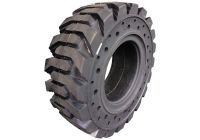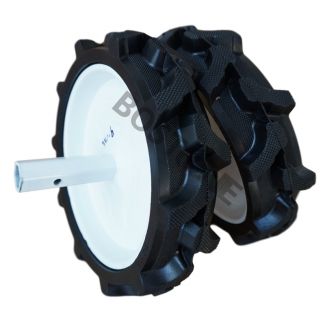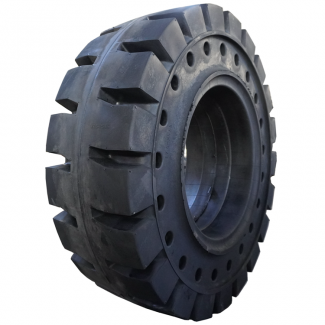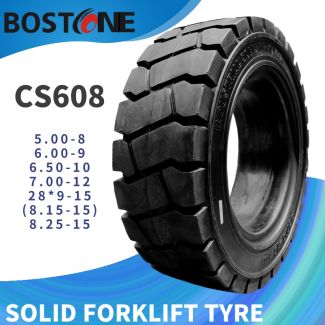Sprayer tyres, Rice transplanter tires and wheels, Agricultural tyres, tractor tires, Industrial Tyres, OTR Tires, skid tires, truck tires

In the world of industrial vehicles, where efficiency, safety, and durability are paramount, the choice of tyres can significantly impact the performance and productivity of operations. Solid tyres, also known as airless tyres, have become the go-to option for a wide range of industrial applications, from forklifts to construction vehicles and heavy-duty equipment. Unlike pneumatic (air-filled) tyres, solid tyres are made entirely of solid rubber or other resilient compounds, offering unparalleled durability and reliability in demanding environments.
At Bostone, a leader in manufacturing high-quality tyres, we understand the crucial role that solid tyres play in enhancing the performance of industrial vehicles. This article will explore the reasons why solid tyres are essential for industrial vehicles, highlighting their key features, advantages, and applications.

Solid tyres are tyres made from a solid rubber compound or a combination of rubber and other materials, making them puncture-proof and resistant to wear. Unlike pneumatic tyres that rely on air pressure to maintain their shape and provide cushioning, solid tyres are inherently solid, eliminating the risk of flats or blowouts. This makes them ideal for industrial vehicles that operate in harsh conditions, such as construction sites, warehouses, and manufacturing plants.
Solid tyres are designed to withstand heavy loads, tough terrains, and frequent use, making them the preferred choice for vehicles that require maximum reliability and durability.
Several features set solid tyres apart from pneumatic tyres, making them particularly well-suited for industrial applications:
One of the most significant advantages of solid tyres is their puncture-proof design. Since they do not rely on air, there is no risk of flats caused by sharp objects such as nails, glass, or debris. This feature is especially important for industrial vehicles that frequently operate in hazardous environments, such as construction sites or recycling facilities, where sharp objects are common.
Solid tyres are built to last longer than pneumatic tyres. Their durable construction makes them resistant to wear, cuts, and abrasions, even in challenging conditions. This extended lifespan translates into lower maintenance costs and fewer tyre replacements, which can significantly reduce downtime and increase the efficiency of industrial operations.
With solid tyres, there's no need to regularly check and adjust tyre pressure, as you would with pneumatic tyres. This low-maintenance feature saves time and resources for industrial vehicle operators, allowing them to focus on their core tasks rather than constantly attending to tyre issues.
Solid tyres offer superior stability, particularly under heavy loads. They are designed to handle the weight and pressure of industrial vehicles carrying heavy materials, ensuring that the vehicle remains stable and balanced even when fully loaded. This stability is crucial for safety and smooth operation in environments where precision and control are essential.
Solid tyres are more resistant to heat generated from constant use and heavy loads. Pneumatic tyres can overheat during extended periods of use, leading to potential blowouts. Solid tyres, on the other hand, are designed to dissipate heat more effectively, reducing the risk of overheating and ensuring continuous, safe operation.

Solid tyres have become indispensable in various industries due to their durability, reliability, and ability to perform under extreme conditions. Below are the key reasons why solid tyres are essential for industrial vehicles:
Industrial vehicles often operate in environments where safety is a top priority. From construction sites filled with sharp objects to warehouses with uneven flooring, these environments pose numerous hazards to vehicles with pneumatic tyres. A flat tyre caused by a puncture can lead to dangerous situations, particularly when operating heavy machinery.
Solid tyres eliminate the risk of punctures, blowouts, and sudden air loss, ensuring that industrial vehicles maintain consistent traction and stability. This increased safety reduces the likelihood of accidents, injuries, or costly equipment damage.
In industrial settings, downtime is costly. Every minute that a vehicle is out of operation due to tyre repairs or replacements leads to delays in production or project completion. Pneumatic tyres are susceptible to punctures and blowouts, requiring frequent repairs or replacements, which can cause unwanted downtime.
Solid tyres are built to withstand rough conditions without the risk of punctures, meaning vehicles equipped with solid tyres can keep working without interruption. The durability of solid tyres ensures longer intervals between replacements, minimizing downtime and increasing operational efficiency.
While solid tyres may have a higher upfront cost compared to pneumatic tyres, they offer significant long-term savings. The extended lifespan, reduced risk of flats, and lower maintenance requirements contribute to lower operational costs over time. Businesses can save on tyre replacements, repairs, and the labor costs associated with maintaining pneumatic tyres.
For companies that rely on fleets of industrial vehicles, the cost savings from using solid tyres can be substantial. Fewer tyre replacements and less maintenance translate into a more streamlined, cost-efficient operation.
Solid tyres are designed to handle tough terrains and uneven surfaces. Industrial vehicles often need to navigate through rough, gravelly, or uneven ground, which can be challenging for pneumatic tyres. Solid tyres provide excellent traction and stability, allowing vehicles to move smoothly over such terrains without the risk of punctures or loss of control.
Whether it's in a warehouse, construction site, or factory floor, solid tyres provide the reliability needed to tackle challenging environments, making them ideal for forklifts, loaders, and other heavy-duty industrial vehicles.
Solid tyres are capable of supporting heavier loads than pneumatic tyres, making them essential for industrial vehicles that carry heavy materials or equipment. The added stability and strength of solid tyres ensure that the vehicle remains balanced and secure, even when operating under maximum load capacity.
This load-bearing capability is crucial in industries like construction, manufacturing, and logistics, where vehicles are required to transport heavy goods consistently and safely.

Solid tyres are widely used across various industries, powering essential vehicles that keep operations running smoothly. Here are some common applications of solid tyres:
Solid tyres are an essential component for industrial vehicles, offering durability, safety, and cost-efficiency that pneumatic tyres simply cannot match. By eliminating the risk of flats, reducing downtime, and providing superior load-bearing capacity, solid tyres help industrial vehicles perform optimally in challenging environments. At Bostone, we specialize in producing high-quality solid tyres that meet the rigorous demands of industries worldwide. For businesses seeking reliable and long-lasting tyre solutions, solid tyres are the smart choice to enhance operational performance and efficiency.
By Bostone